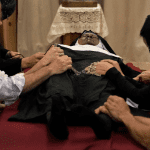
A new poll shows that fewer Americans are sure of the existence of God than ever before. The poll, released by the National Opinion Research Center (NORC) at the University of Chicago, is part of NORC’s General Social Survey (GSS), which has tracked societal trends and changes in the US since 1972. The survey was conducted through in-person interviews, phone interviews, and Internet surveys. The researchers did note that changes in methodology during the pandemic could have resulted in some changes of opinion. Overall, 3,544 surveys were completed from May 4 to Dec. 20, as well as 601 additional completed surveys to increase minority representation.
The latest survey found that just under 50 percent of Americans are sure of the existence of God, responding that they “know God exists and have no doubts.” That number had been nearly 66 percent in 1993 and 60 percent in 2008. Sixteen percent said they “believe in God but have doubts,” while 14 percent stated belief in a higher power. The number of those who did not believe in God stayed steady at seven percent. That number of complete nonbelievers has been steadily rising since 2014. The poll also found that 34 percent of Americans never go to church, the highest that number has ever been since the GSS began tracking. Only four percent stated they attended religious services nearly every week, and five percent stated they attended more than once a week. Thirteen percent said they attended once a year.
René Bautista, GSS director, noted that the past three years since the COVID-19 epidemic have been extremely volatile to American beliefs. “The past three years were a period of great trial and change for the United States. Understanding how these times affected Americans’ thoughts, beliefs, and opinions is critical to understanding social change,” Bautista said. There were also changes in the religiosity of respondents, with 32 percent identifying as “moderately religious,” down from 38 percent in 2018. Fourteen percent of respondents identified as “very religious.” The number of those who are “not religious” also did drop slightly to 29 percent, down from 32 percent in 2021.
Confidence in organized religion has also been dropping precipitously. Forty-five percent of respondents stated they had “a great deal of confidence” in organized religion in 1974. That number has dropped to 15 percent in 2022. Thirty-three percent stated they had “hardly any confidence.” A 2019 Gallup article listed several reasons for the drop in confidence, including sexual abuses revealed in the Catholic church as well as allegations within the Southern Baptists Convention (SBC). The article also noted the politicization of faith, including the split between many evangelicals on how to respond to Donald Trump. “Most broadly of all,” concluded Gallup, “it’s possible that our measurement of confidence in organized religion only reflects a slice of confidence in ‘religion’ per se. We are seeing the continuing trend toward more ad hoc religious entities and ways of worshipping that eschew what is traditional. Thus, the drop in confidence in ‘the church or organized religion’ does not necessarily equate to a drop in confidence in religion.”


